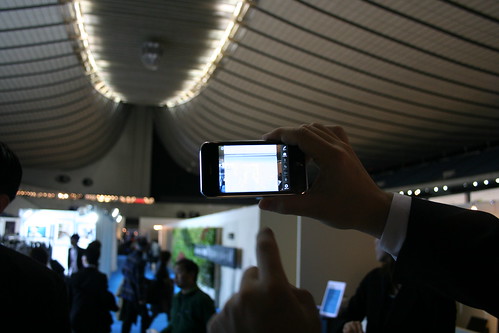Hi Brian,
I tried to reply briefly but as I started writing, I started to feel that I want to summarize how I see iPhone and SoftBank are doing here in Japan in English, and it turned out as a very long e-mail.
I hope you'll enjoy it:
To answer your question, I don't think iPhone is such a big failure in Japan.
The perception of iPhone being a failure was created by a newspaper in Japan, Sankei Shimbun. Last fall, it wrote although Softbank tried to sell one million units by the end of 2008, they only sold about 200,000.
This article was wrong in two fronts.
One is that Softbank nor Apple never publicly claimed they would sell 1 million units.
Second, their estimate of 200,000 units were also wrong.
Although Apple nor Softbank releases the real number of shipment, today, it is strongly believed that they have shipped more than 300,000 and possibly near 400,000 units in Japan.
Interestingly, despite the negative press, Sankei Shimbun did release one of the most successful iPhone app in Japan after that article in which you can read the full Sankei Shimbun newspaper.
Also on January 11th, 2009 they looked back how iPhone did in the first six month and seem to have concluded it wasn't that bad after all; I was in San Francisco that day and didn't get to read the article but I was interviewed for the article.
Now let's talk if 400,000 (or 300,000) is a strong or weak number.
I think this is not at all a weak number especially if you are talking about 2008.
In December 2007, accumulated number of cellphones in Japan surpassed 100,000,000. Today, more than 90% of Japanese adults have one or more cell phones. And some analyst have started warning the slow down of mobile phone sales in Japan.
Some were optimistic because Japanese people change their cell phones so often. Many people change their phones in 1.5 - 2 years and those techie geeks would but a new phones almost every six months or so.
But this had to change, too.
2008 was a big turning point for Japanese mobile industry. In early 2008, Japanese ministry of internal affairs and communications asked all the mobile phone operators to change the way they sell their cell phones.
Before that Japan was abundant of 1 yen cell phones and even 0 yen cell phones with the real cost hidden in the 2 year contract and higher than international average monthly fee. The ministry asked to display the real cost of the phone unit at the store front. And because R&D cost for the Japanese high-tech phones kept going up for the past few years, the customers finally realized the real cost of the handset were actually more than 30,000 yen (about $300) for the mid-range and more than 80,000 yen ($800) for the high-end phones.
Although, few people are paying it in full and are rather paying it monthly for 2 years; still this notion of the real price deeply discouraged people from buying a new phone.
Then came the bad economy.
So 2008 was the year that Japanese mobile phone industry sunk; the total unit shipment of all operators combined went down for 18.7% (according to Japan Electronics and Information Technology Industries Association) to 42 million units which makes iPhone almost has the 1% share; In January 2007, Steve Jobs said he will have 1% share of the worldwide market.
Well, in Japan, too. They got that number of share in this very competitive market.
Of course, I think iPhone can do much better here in Japan.
The Japanese media talked so much about iPhone during the first week, but all they were talking about were:
-touch interface
-you can't use emoji (please goolge it, if you don't know what it is)
-you can't watch TV on it; 86.3% of all phones shipped in Japan has built-in TV tuners
-you can't use it as your Osaifu-keitai:
Softbank, the operator in Japan did a very good follow up job by pusuading Apple to support emoji on iPhone as well as inventing a way to watch TV on iPhone and actually selling that device which also works as an external battery.
Still the lack of Osaifu-keitai is a serious thing for those living in Tokyo.
Although I am perhaps, the most famous advocate of iPhone in Japan, I still use other phones to use the Osaifu-keitai feature.
I use it to get on train (so I don't need to purchase tickets), with it I don't have to go to the counter at the airport and go directly to the boarding gate (because it works as your electronic ticke for airplane, too). I can ride a taxi with it and buy almost anything and eat/drink any thing at any of those shopping complex run by Japanese Railways group.
But some iPhone fanatic are doing a work around for that, too. They attach an equivalent Felica IC card behind iPhone like this:
But despite the hardwork of SoftBank and the iPhone fanatic, these facts are shared only among iPhone owners in Japan and are rarely known for most of the other Japanese. SoftBank did send out a press release for the TV & Battery device but it didn't make such a big news. I asked on SoftBank official casually why they don't advertise more on this device.
And his answer was " we need to get approval from Apple for most advertising marketing effort." So SoftBank like perhaps, most of the other iPhones operators around the world are not in the liberty to publicize their own good effort.
For majority of Japanese, iPhone looks interesting but it is the device they read on the newspaper as a 'failure.' They haven't even touched one.
So as soon as I give lecture, show it to them and let them play with it, they change their mind and become a fan of iPhone.
I think iPhone sales in Japan can improve much more here in Japan.
But in order to do that, I think SoftBank has to have more control in how they market / advertise the device here in Japan.
They know the market much better than Apple does.
And they know how to make TV commercials that would appeal to Japanese consumers.
SoftBank is doing a wonderful advertisement job in Japan, and they have their TV ads have been chosen as the most favored TV advertisement for almost two years for consecutive months; they didn't win only the overall prize but they are winning the best actor, best actress and almost all the prizes awarded by CM DATABANK (
http://www.cmdb.jp/ranking/2008.php).
Sure, Apple is a global company and they succeeded by controlling their brand value so well; and the vector of that branding may not match the branding of SoftBank (as with any other operators around the globe).
Apple can push the "Apple-way" to their partner like SoftBank claiming they "Think global" (just like the George W. Bush pushed the America-ism to the world), but it doesn't necessarily means the consumer would buy it.
The same tug-of-war like problem is happening in the enterprise area.
As you may have already read somewhere, one of the first and largest iPhone installment in enterprise took place in Japan at the Bearing Point System's Japanese branch office; they swap all their 1,000 NTT DoCoMo phones to iPhones; and most of the employees seem to be pretty happy with them.
But if they try to do any serious enterprise staff, they don't know if they should turn to SoftBank or to Apple.
I love iPhone and I think iPhone can be a bigger success here in Japan, but in order to make it so, Apple has to trust SoftBank and reinvent the relationship; I think SoftBank is very different from any other operators in the world which other operators in the world, have you seen going direct to Apple and ask to include certain features to the iPhone?
Of course, SoftBank is not perfect.
In my perception, SoftBank has a few glitches as well.
One is the wireless coverage. Although the coverage is more than 97 or 8 % (can't find the figure right away, will check, if you need it) much better than the average of US operators, it is still lower compared to NTT DoCoMo and KDDI.
But there is a reason. The other two major carriers have access to 800 MHz frequency which the new comer SoftBank was not allowed to use; SoftBank expect the government will license it but it won't happen until 2015.
Second, even though they make the most beloved TV commercials still they lack credibility from the older traditional Japanese.
Just as there are so many Windows users who would never even bother to try a Mac, there are so many NTT DoCoMo users who would never even bother to switch the operators.
Because you can trace back the root of NTT DoCoMo to the government owned Nippon Telegraph and Telephone Public Corporation, people just trust it by it.
And because SoftBank is a company run by Korean-Japanese businessman, Masayoshi Son, some older generation are skeptical. Perhaps, there could even be racial discrimination involved, but whatever SoftBank does, bad press follows it.
SoftBank is struggling to build credibility toward Japanese press about the "SoftBank would soon go bankrupt" rumors; if I go to quarterly report, most of the American Financial analyst and press (and some Japanese) seem to be convinced by what Masayoshi Son says, the bad press still continues.
But if that turns out to harm the iPhone sales in Japan, I think Apple will change their deal with SoftBank and start selling iPhone through NTT DoCoMo as well. Actually, Japanese press, including me, has been writing this for a long time; and I think this has been harming SoftBank iPhone sales, too. Those iPhone fans who use NTT DoCoMo right now kind of waited until the DoCoMo version comes out. Some gave up and switched to SoftBank, some can't switch, so they added iPhone as the second phone, but there are still many who can't take either way and sticking with the old NTT DoCoMo phone.
After iPhone came out, NTT DoCoMo had to go through a major re-organization but I believe they are still interested in iPhone.
Anyway, it has become a long e-mail but this is how I see iPhone and SoftBank is doing in Japan right now.
If you want to use any specific numbers and credit the source, tell me, and I will try to send you the link or the name of the source.
I believe you will be only using a small portion of this e-mail in your article. So if you don't mind, I would like to edit this a bit and post to my English blog because I haven't updated that for a while; perhaps, with an affiliated link to the issue of Wired magazine, you will be writing this article for or something.
thanks,
Nobi
______________________________
_______________________________ n o b i _
N o b u y u k i H a y a s h i- Hide quoted text -
On Fri, Feb 27, 2009 at 2:51 AM, Chen, Brian
<-----@wired.com> wrote:
Hey Nobi --
Leander Kahney passed along your contact information to me. I understand you're pretty knowledgeable about cellphones in Japan, and I was wondering if you could happened to know why the iPhone is failing there. Would you mind sharing your insights in this e-mail?
Thanks in advance,
<font color="#888888">
Brian
</font>



